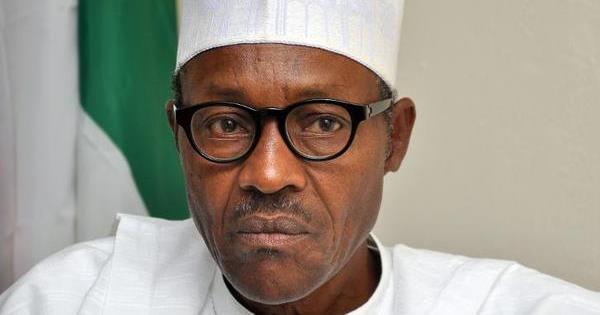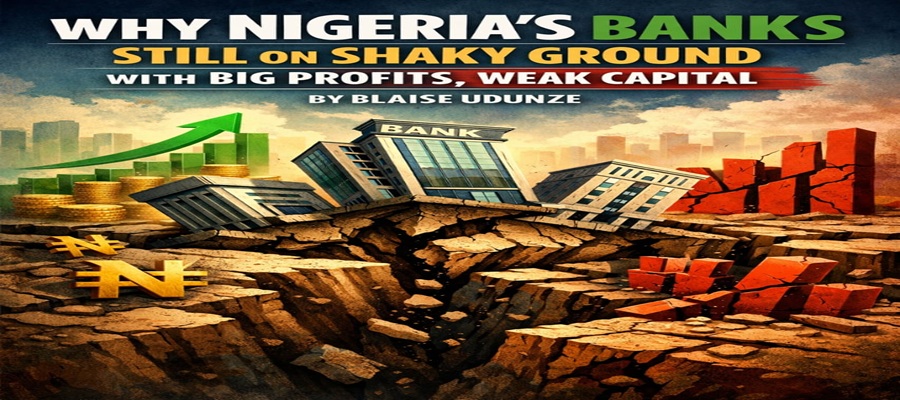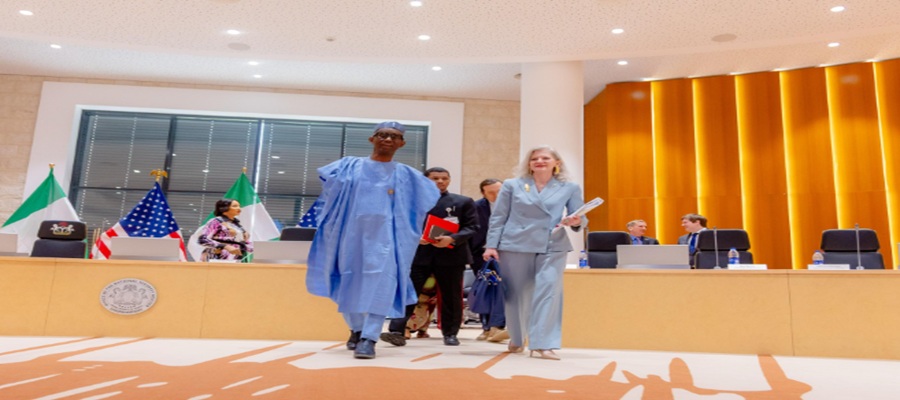General News
Nigeria’s Gradual Road to Economic Recovery

By Lukman Otunuga, Senior Research Analyst at FXTM
Africa’s largest economy has displayed resilience over the past few months.

From defending against the Covid-19 menace to battling untamed inflation and shouldering domestic risks. Initially, the economic outlook was bleak during 2020 after the economy sunk back into its second recession in less than five years. Lockdown restrictions caused significant disruptions in the value chain, halted most aspects of the economy while crippling the manufacturing sector. A growing sense of alarm and unease over surging coronavirus cases added to the uncertainty, ultimately fanning fears around Nigeria experiencing a prolonged economic recession.
However, the economic expansion of 0.11% in Q4 2020 came as a breath of fresh air and offered some light at the end of the tunnel. Although the economy contracted 1.92% for the full year, the rebound during the final quarter raised hopes that Africa’s largest economy was exiting from the Covid-19 induced recession.
World Bank projects Nigeria to expand 1.1% in 2021
According to World Bank, economic growth is expected to expand by 1.1% this year while Bloomberg forecasts GDP to contract by 1.5% in Q1 2021. Nigeria certainly has the potential to exceed these growth estimates due to rising oil prices and improving global economic conditions. It must be kept in mind that earnings from oil exports account for over half of government revenues and about 90% of foreign-exchange earnings. As oil prices appreciate, this provides the government with ammunition to attack domestic risks threatening the country’s fragile economic outlook. In regards to other key metrics, inflation is seen averaging around 14% while the Central Bank of Nigeria (CBN) is forecast to hike interest rates at least once this year as economic conditions improve.
No love for the Naira
The past few months have certainly not been kind to the local currency. It has weakened considerably on the black-market exchange, trading around 482N per Dollar compared to the 380N official rate. An unappetizing combination of depressed oil prices, dollar shortages, and rising inflationary pressures exposed the emerging market currency to downside risks.
Devaluation third time lucky?
Unfavourable domestic conditions forced the Central Bank of Nigeria (CBN) to devalue the Naira twice in 2020 with CBN governor Godwin Emefiele recently confirming another devaluation to N410 against the dollar. Indeed, a weaker rate would boost government revenue from oil exports – a welcome development for the energy producer. If the Naira weakens, this could bolster revenues from crude, which is sold in Dollar but converted to Naira.
It does not end here. Nigeria’s economic prospects could brighten if the devaluation opens doors to fresh discussions with the World Bank regarding a $1.5 billion loan. Confusion around Nigeria’s multiple exchange rates has hindered investor attraction with major institutions requesting currency reforms to rekindled investment.
Inflation remains a cause for concern
But a weaker Naira may lead to untamed inflation…
Inflationary pressures have punished consumers and threatened the country’s fragile recovery. In January, consumer prices jumped to 16.47% more than double the target of 7.5% thanks to supply disruptions, dollar restrictions, and removal of oil subsidies.
Nigeria is dealing with a cost-push inflation scenario where overall prices have increased due to the rising cost of production and raw materials. The government could pursue deflationary fiscal policy or monetary authorities could increase rates, but this may do more damage than good.
Diversification & oil reliance
It is widely known that diversification has the potential to cure Nigeria’s dependence on oil. However, the country’s economic outlook remains heavily influenced by the commodity’s performance. The good news is that oil prices have appreciated over 25% since the start of 2021 thanks to OPEC+ cuts, optimism over US stimulus, and robust demand from China. But the bad news is that West Africa’s biggest oil producer has seen its shipments fall in recent months thanks to infrastructure issues with production falling to 1.50 mbpd according to data from Bloomberg.
OPEC+ meeting in focus
The OPEC+ meeting in March may indirectly impact Nigeria’s economic outlook.
While Saudi is publicly urging fellow members to be extremely cautious despite prices rebounding to pre-pandemic levels, Moscow on the other hand is indicating that it still wants to proceed with a supply increase. Another question is whether Saudi Arabia will continue its voluntary production cuts of 1 million barrels per day. Market expectations are rising over OPEC+ easing supply curbs after April thanks to rising oil prices. But given the nature of OPEC+ and the outcome of previous meetings – anything could be on the table.
Even if oil prices appreciate following the OPEC meeting, gasoline prices will remain unchanged in March indicating that the costly fuel subsidies are back. With inflation at a 12-year high, rising fuel costs could pour fuel into the fire – leading to further uncertainty.
CBN rate hike in 2021?
The million-dollar question is not “if” but “when” the CBN will hike interest rates.
Globally, fiscal policy has been labelled as a more effective weapon against covid-19. However, a large share of Nigeria’s revenues is spent on repaying debts. This has left little room for critical social and infrastructure spending to shield the economy from the negative impacts of Covid-19.
Monetary policymakers remain in a tricky spot after the Covid-19 menace spread its poisonous tentacles across the economy. The pandemic resulted in lockdowns, reduced activity, a weakened Naira, and stagflation. While a rate hike will increase the cost of borrowing, effectively reducing inflation – this may result in a bigger fall in GDP. However, the options are limited within the monetary policy toolbox with unconventional tools such as loan to deposit ratio, liquidity ratio, and cash reserve ratio in focus.
General News
Why Nigeria’s Banks Still on Shaky Ground with Big Profits, Weak Capital

By Blaise Udunze
Despite the fragile 2024 economy grappling with inflation, currency volatility, and weak growth, Nigeria’s banking industry was widely portrayed as successful and strong amid triumphal headlines. The figures appeared to signal strength, resilience, and superior management as the Tier-1 banks such as Access Bank, Zenith Bank, GTBank, UBA, and First Bank of Nigeria, collectively reported profits approaching, and in some cases exceeding, N1 trillion. Surprisingly, a year later, these same banks touted as sound and solid are locked in a frenetic race to the capital markets, issuing rights offers and public placements back-to-back to meet the Central Bank of Nigeria’s N500 billion recapitalisation thresholds.

The contradiction is glaring. If Nigeria’s biggest banks are so profitable, why are they unable to internally fund their new capital requirements? Why have no fewer than 27 banks tapped the capital market in quick succession despite repeated assurances of balance-sheet robustness? And more fundamentally, what do these record profits actually say about the real health of the banking system?
The recapitalisation directive announced by the CBN in 2024 was ambitious by design. Banks with international licences were required to raise minimum capital to N500 billion by March 2026, while national and regional banks faced lower but still substantial thresholds ranging from N200 billion to N50 billion, respectively. Looking at the policy, it was sold as a modern reform meant to make banks stronger, more resilient in tough times, and better able to support major long-term economic development. In theory, strong banks should welcome such reforms. In practice, the scramble that followed has exposed uncomfortable truths about the structure of bank profitability in Nigeria.
At the heart of the inconsistency is a fundamental misunderstanding often encouraged by the banks themselves between profits and capital. Unknown to many, profitability, no matter how impressive, does not automatically translate into regulatory capital. Primarily, the CBN’s recapitalisation framework actually focuses on money paid in by shareholders when buying shares, fresh equity injected by investors over retained earnings or profits that exist mainly on paper.
This distinction matters because much of the profit surge recorded in 2024 and early 2025 was neither cash-generative nor sustainably repeatable. A significant portion of those headline banks’ profits reported actually came from foreign exchange revaluation gains following the sharp fall of the naira after exchange-rate unification. The industry witnessed that banks’ holding dollar-denominated assets their books showed bigger numbers as their balance sheets swell in naira terms, creating enormous paper profits without a corresponding improvement in underlying operational strength. These gains inflated income statements but did little to strengthen core capital, especially after the CBN barred banks from using FX revaluation gains for dividends or routine operations. In effect, banks looked richer without becoming stronger.
Beyond FX effects, Nigerian banks have increasingly relied on non-interest income fees, charges, and transaction levies to drive profitability. While this model is lucrative, it does not necessarily deepen financial intermediation or expand productive lending. High profits built on customer charges rather than loan growth offer limited support for long-term balance-sheet expansion. They also leave banks vulnerable when macroeconomic conditions shift, as is now happening.
Indeed, the recapitalisation exercise coincides with a turning point in the monetary cycle. The extraordinary conditions that supported bank earnings in 2024 and 2025 are beginning to unwind. Analysts now warn that Nigerian banks are approaching earnings reset, as net interest margins the backbone of traditional banking profitability, come under sustained pressure.
Renaissance Capital, in a January note, projects that major banks including Zenith, GTCO, Access Holdings, and UBA will struggle to deliver earnings growth in 2026 comparable to recent performance.
In a real sense, the CBN is expected to lower interest rates by 400 to 500 basis points because inflation is slowing down, and this means that banks will earn less on loans and government bonds, but they may not be able to quickly lower the interest they pay on deposits or other debts. The cash reserve requirements are still elevated, which does not earn interest; banks can’t easily increase or expand lending investments to make up for lower returns. The implications are significant. Net interest margin, the difference between what banks earn on loans and investments and what they pay on deposits, is poised to contract. Deposit competition is intensifying as lenders fight to shore up liquidity ahead of recapitalisation deadlines, pushing up funding costs. At the same time, yields on treasury bills and bonds, long a safe and lucrative haven for banks are expected to soften in a lower-rate environment. The result is a narrowing profit cushion just as banks are being asked to carry far larger equity bases.
Compounding this challenge is the fading of FX revaluation windfalls. With the naira relatively more stable in early 2026, the non-cash gains that once flattered bank earnings have largely evaporated. What remains is the less glamorous reality of core banking operations: credit risk management, cost efficiency, and genuine loan growth in a sluggish economy. In this new environment, maintaining headline profits will be far harder, even before accounting for the dilutive impact of recapitalisation.
That dilution is another underappreciated consequence of the capital rush. Massive share issuances mean that even if banks manage to sustain absolute profit levels, earnings per share and return on equity are likely to decline. Zenith, Access, UBA, and others are dramatically increasing their share counts. The same earnings pie is now being divided among many more shareholders, making individual returns leaner than during the pre-recapitalisation boom. For investors, the optics of strong profits may soon give way to the reality of weaker per-share performance.
Yet banks have pressed ahead, not only out of regulatory necessity but also strategic calculation.
During this period of recapitalization, investors are interested in the stock market with optimism, especially about bank shares, as banks are raising fresh capital, and this makes it easier to attract investments. This has become a season for the management teams to seize the moment to raise funds at relatively attractive valuations, strengthen ownership positions, and position themselves for post-recapitalisation dominance. In several cases, major shareholders and insiders have increased their stakes, as projected in the media, signalling confidence in long-term prospects even as near-term returns face pressure.
There is also a broader structural ambition at play. Well-capitalised banks can take on larger single obligor exposures, finance infrastructure projects, expand regionally, and compete more credibly with pan-African and global peers. From this perspective, recapitalisation is not merely about compliance but about reshaping the competitive hierarchy of Nigerian banking. What will be witnessed in the industry is that those who succeed will emerge larger, fewer, and more powerful. Those that fail will be forced into consolidation, retreat, or irrelevance.
For the wider economy, the outcome is ambiguous. Stronger banks with deeper capital buffers could improve systemic stability and enhance Nigeria’s ability to fund long-term development. The point is that while merging or consolidating banks may make them safer, it can also harm the market and the economy because it will reduce competition, let a few banks dominate, and encourage them to earn easy money from bonds and fees instead of funding real businesses. The truth be told, injecting more capital into the banks without complementary reforms in credit infrastructure, risk-sharing mechanisms, and fiscal discipline, isn’t enough as the aforementioned reforms are also needed.
The rush as exposed in this period, is that the moment Nigerian banks started raising new capital, the glaring reality behind their reported profits became clearer, that profits weren’t purely from good management, while the financial industry is not as sound and strong as its headline figures. The fact that trillion-naira profit banks must return repeatedly to shareholders for fresh capital is not a sign of excess strength, but of structural imbalance.
With the deadline for banks to raise new capital coming soon, by 31 March 2026, the focus has shifted from just raising N500 billion. N200 billion or N50 billion to think about the future shape and quality of Nigeria’s financial industry, or what it will actually look like afterward. Will recapitalisation mark a turning point toward deeper intermediation, lower dependence on speculative gains, and stronger support for economic growth? Or will it simply reset the numbers while leaving underlying incentives unchanged?
The answer will define the next chapter of Nigerian banking long after the capital market roadshows have ended and the profit headlines have faded.
Blaise, a journalist and PR professional, writes from Lagos and can be reached via: [email protected]
General News
WEBINAR: Techeconomy Business Series Hosts Experts from MTN, Interswitch, BusinessPlus, others this Wednesday

Techeconomy, Africa’s leading technology, business and digital economy publication, has announced an upcoming edition of its Techeconomy Business Series, a virtual webinar.

Techeconomy
This month’s edition focused on “Navigating a Career in Tech Sales”, is scheduled for Wednesday, January 28, 2026, from 5:00 PM to 6:00 PM (WAT)
Register here: https://shorturl.at/mMvLu),
It will bring together seasoned professionals from across Africa’s technology ecosystem to share practical insights, real-life experiences, and career guidance for individuals looking to build or transition into successful careers in tech sales.
“As Africa’s digital economy continues to expand, tech sales has emerged as a critical growth driver, bridging innovation, customer adoption, and revenue generation,” said Joan Aimuengheuwa, managing editor at Techeconomy.
“The session is designed to equip professionals, young talents, and business leaders with a clearer understanding of the skills, mindset, and career pathways required to succeed in this fast-evolving field”, she added.
The panel features accomplished industry experts including, divisional head, Growth Marketing (Enterprise), Interswitch Group; Ekundayo Ayeni, co-founder, BusinessPlus; Adepeju Ajayi, manager, Mobile Advertising, MTN Nigeria; and Bukayo Ewuoso, Business Growth Consultant.
The session will be hosted by Imoh Anselem, an IT Project Manager and Customer Success Specialist.
Participants will gain insights into: Ogechi Okwechime
· Breaking into tech sales and identifying entry opportunities
· Key skills and competencies employers look for
· Career growth strategies within Africa’s digital economy
· Lessons from real-world sales and growth experiences
Webinar Details:
Date: Wednesday, January 28, 2026 | Time: 5:00 PM – 6:00 PM (WAT) | Format: Virtual (Zoom)
Registration/Access Link: https://shorturl.at/mMvLu
Attendance is free, but registration is required.
“The Techeconomy Business Series is part of Techeconomy’s ongoing commitment to fostering informed conversations, capacity building, and talent development across Africa’s technology and business landscape”, the managing editor added.
TAGS: #TechSales, #Techeconomy, #Techeconomy, #TechSales, #CareerInTech, #DigitalEconomy, #BusinessSeries, #AfricaTech, #TBS #TecheconomyBusinessSeries
General News
Nigeria Treats Religious Violence as Attack on State – NSA Ribadu

National Security Adviser Nuhu Ribadu has said the federal government considers religious violence an attack on the Nigerian state, stressing that the protection of all citizens, regardless of faith, is non-negotiable.

According to presidential spokesperson Bayo Onanuga, Ribadu made the remarks in Abuja at the close of a US–Nigeria Joint Working Group session.
“Nigeria is a deeply plural society, and the protection of all citizens, Christians, Muslims, and those of other beliefs, is non-negotiable,” Ribadu said.
“Violence framed along religious lines is treated as an attack on the Nigerian state itself.”
In a follow-up post on X, Ribadu said the joint working group has recorded “tangible operational gains” in the fight against terrorism.
The working group was set up following Nigeria’s designation as a Country of Particular Concern (CPC) by US President Donald Trump, a label that often triggers policy actions aimed at ending severe violations of religious freedom.
At the meeting, Ribadu led Nigeria’s delegation, which included representatives from 10 ministries and agencies, while the US delegation, made up of eight federal agencies, was led by Allison Hooker, US under-secretary of state.
Ribadu said Nigeria-US security cooperation has moved from dialogue to action, resulting in the disruption of terrorist networks and transnational criminal groups. He also praised the US for supplying drones, helicopters, platforms, spare parts, and other support systems over the past five years.
Speaking at the session, Hooker said the US was committed to expanding its partnership with Nigeria, particularly on deterring violence against Christian communities.
“Today, we are here to discuss how we can work together to deter violence against Christian communities, prioritising counter-terrorism, insecurity, investigation of attacks, and holding perpetrators accountable,” she said.
She added that efforts would focus on reducing killings, forced displacement, and abductions of Christians, especially in Nigeria’s north-central states

 News1 day ago
News1 day agoAnambra Cuts Monday Pay to Kill Sit-at-Home

 E-Financial1 day ago
E-Financial1 day agoFirst Asset Management Receives Upgraded Ratings from Agusto &Co and DataPro

 General News1 day ago
General News1 day agoNigeria Treats Religious Violence as Attack on State – NSA Ribadu

 E-Financial1 day ago
E-Financial1 day agoCBN Prepares Fresh Debit Card Rules to Improve ATM Services

 E-Financial1 day ago
E-Financial1 day agoNIBSS, Others Flag 13,417 Nigerian Fraudsters on Person of Interest Portal

 News1 day ago
News1 day agoLIRS to Invoke NTAA to Recover Unpaid Taxes from Bank Accounts, Others

 General News8 hours ago
General News8 hours agoWEBINAR: Techeconomy Business Series Hosts Experts from MTN, Interswitch, BusinessPlus, others this Wednesday

 News8 hours ago
News8 hours agoTech Executives Double Down on AI, Talent and Adaptive Strategies to Lead in the Intelligence Age


























